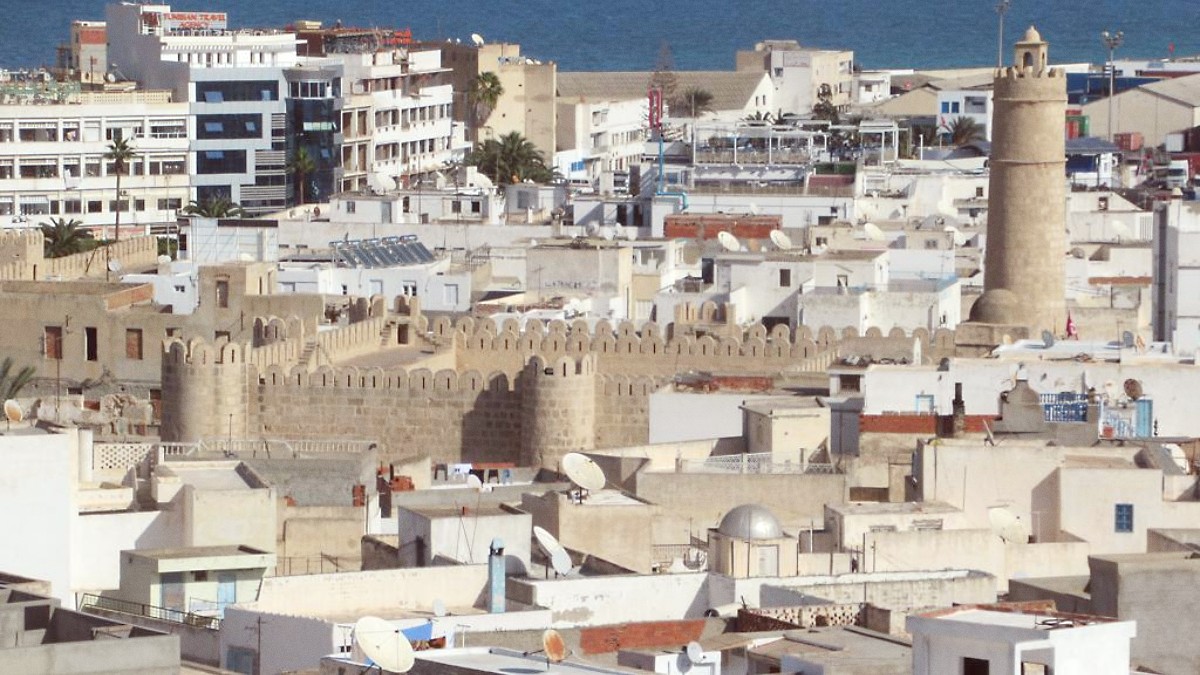
Central Tunisia, Tunisia
Olive oil is a staple, used generously. Tomatoes, fresh or paste, are a rich base. Harissa, a fiery red chili paste, is a recognizable Tunisian flavor, served with almost every meal.
Common ingredients: tuna, eggs, lamb, chicken, chickpeas, peppers, zucchini, potatoes, onions. Fresh seafood features prominently. Spices: caraway, coriander, garlic, mint, saffron, turmeric.
Sousse, a coastal city, features a stronger emphasis on fresh seafood, found in abundance.
The Sahel region, including Sousse, is known for high-quality olive oil and specific types of pastries.
Southern regions may offer desert-influenced dishes; northern regions might show more European influences.
Tunisia's national dish. Steamed semolina grains with a rich, savory stew of vegetables and meat (lamb, chicken, or fish). Seafood couscous is a specialty.
Find it everywhere, from local eateries to fine dining.
A popular appetizer or snack. Crispy pastry (malkouf) with a whole egg (often runny), tuna, parsley, onion, and sometimes capers or cheese. Deep-fried.
Find it at small eateries and street stalls.
A fiery red chili paste (roasted red peppers, garlic, caraway, coriander). Served with almost every meal, often with olive oil.
Purchase authentic Harissa in local markets.
Kaftaji (deep-fried vegetables with egg/sausage), Makloub (stuffed flatbread), Bambalouni (sweet fried donuts).
Mint Tea (sweet, refreshing), Turkish Coffee (strong), Boukha (fig brandy), Thibarine (date liqueur), Local Wines, Celtia (local beer).
Sophisticated atmospheres and refined cuisine for an upscale experience.
A balance of quality food, comfortable settings, and reasonable prices.
Authentic and budget-friendly options.
A bustling market in Sousse, selling fresh produce, aromatic spices, various meats, fresh fish, and local goods.
A true taste of local life and ingredients.
Sousse, especially Port El Kantaoui, has restaurants with Italian, French, Turkish, and other international cuisines.
Familiar fast-food chains are also an option for quick meals.
Sweet cream from pine nuts (Assidat Zgougou), notably during Mawlid.
Semolina pastries with sweet dates, steeped in honey or syrup. Kairouan is famous for these.
Layers of filo dough with chopped nuts, sweetened with syrup or honey.
During Ramadan: Chorba (soup), brik, sweet pastries (Zlabia). Consumed after sunset for Iftar.
Tunisia is predominantly Muslim, so almost all meat served is halal. Kosher food is not widely available outside specific Jewish communities (e.g., Djerba Island). Bring your own supplies if needed.
Dining is straightforward for Muslim travelers.
Gluten-free dining is challenging due to staple foods like couscous and bread. Communicate needs clearly using a Translation app or phrasebook.
Carry an Allergy translation card in French or Arabic for kitchen staff.
Assida (pine nut cream), Makroudh (semolina-date pastries), Baklava (filo, nuts, syrup).
Ramadan features special dishes like chorba, brik, Zlabia, and Makroudh after sunset for Iftar.
Some craft workshops in Sousse's Medina might offer short demonstrations or classes on traditional Tunisian crafts (pottery, leatherwork).
Resorts in Port El Kantaoui feature evening entertainment (traditional music, folkloric dances, belly dancing).
Somewhat limited in urban Sousse. Guided tours to nearby rural villages can offer immersive community experiences.
Tours, notably in the Medina, involve sampling street food, visiting local markets, and learning about the cultural significance of dishes.
An excellent way to experience the vibrancy of Sousse's food scene.
Traditional houses like Dar Antonia offer charming settings with authentic Tunisian meals. Coastal seafood restaurants give direct access to fresh catches.
Look for restaurants with direct views of the sea or port for the freshest seafood.
Inquire at the tourist information office for current event listings or special programming.
Consider initiatives that support local economies and communities through tourism.
Direct communication with restaurant staff and locals truly deepens the experience.
While Sousse is a tourist hub, seeking experiences slightly off the main path can offer a richer cultural connection.